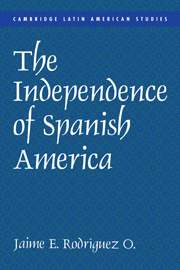2 - Revolution in the Spanish World
Published online by Cambridge University Press: 05 October 2013
Summary
During the second half of the eighteenth and the early nineteenth centuries, the Atlantic world underwent a major transformation. That process included a number of interrelated changes: a demographic expansion; the emergence of the bourgeoisie, or middle class; the growth of the region's economies; the restructuring of the British, French, and Iberian empires; the emergence of Britain as the first great industrial and commercial power; the triumph of a modern system of thought known as the Enlightenment; and the transformation of Western political systems, including the expansion of representative government in Britain, the independence of the United States, the French Revolution, the new French imperialism, and the European wars it engendered. These events culminated in a profound political revolution in the Spanish world.
The Intellectual Revolution
The great enlightened king Carlos III (1759–1788) presided over a major intellectual transformation in Spain and America. During his reign, the Enlightenment won adherents in the Spanish world. The Hispanic variant was neither radical nor anti-Christian, as in France. But like the Enlightenment everywhere, the Hispanic movement admired classical antiquity, preferring science and reason to authority and useful knowledge to theory. As José Miranda indicated, “The Enlightenment was neither a theory nor a doctrine, but a new way of looking at things and interpreting life.… The Enlightenment possessed, however, a principle common to the multitude of ideas that sprouted in its bosom: the liberty or autonomy of reason.”
- Type
- Chapter
- Information
- The Independence of Spanish America , pp. 36 - 74Publisher: Cambridge University PressPrint publication year: 1998

